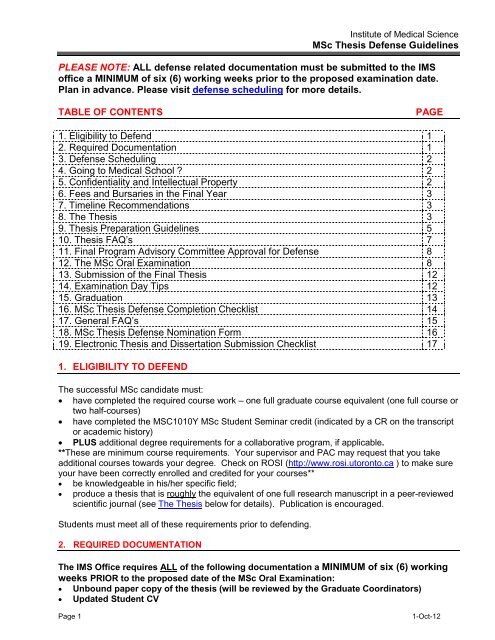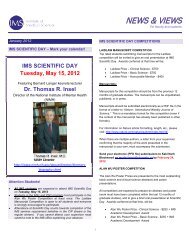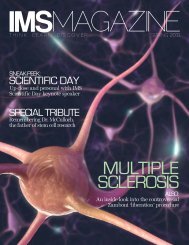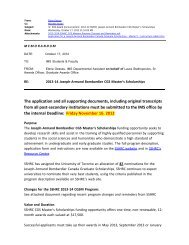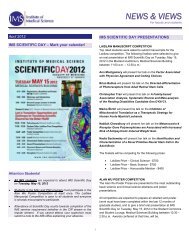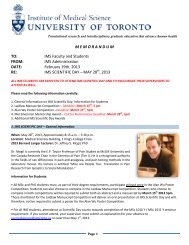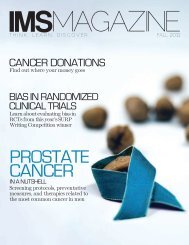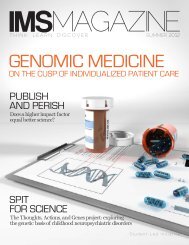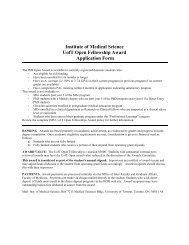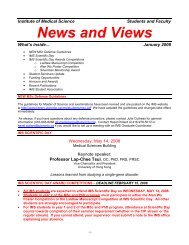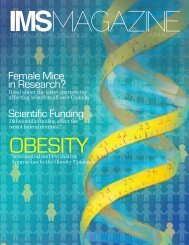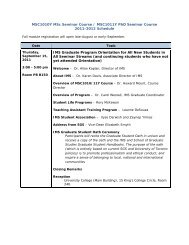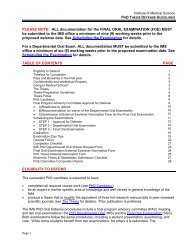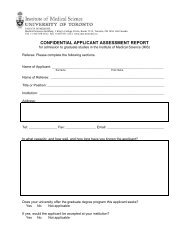MSc Examination Guidelines - Institute of Medical Science
MSc Examination Guidelines - Institute of Medical Science
MSc Examination Guidelines - Institute of Medical Science
Create successful ePaper yourself
Turn your PDF publications into a flip-book with our unique Google optimized e-Paper software.
<strong>Institute</strong> <strong>of</strong> <strong>Medical</strong> <strong>Science</strong><strong>MSc</strong> Thesis Defense <strong>Guidelines</strong>• Completed <strong>MSc</strong> Thesis Defense Nomination Form. All committee members must haveagreed to be available on the listed potential examination date(s).• Final PAC Report3. DEFENSE SCHEDULINGWhen settling on a defense date and time with your committee, please note the following schedulinglimitations:• The defense may start no earlier than 9am and no later than 3pm, Monday through Friday.• The defense may only take place on days that the university is open. Please visit the School <strong>of</strong>Graduate Studies (SGS) sessional dates calendar for holidays and university closures :http://www.sgs.utoronto.ca/calendar.htm• In order to be eligible for the next round <strong>of</strong> convocation, students must defend a MINIMUM <strong>of</strong> oneweek prior to the final date for receipt <strong>of</strong> degree recommendations as listed in the SGS sessionaldates calendar: http://www.sgs.utoronto.ca/calendar/2012-13.htmFor example: If a student wishes to convocate in November, they must defend no later than Sept.28th (1 week prior to the degree recommendation deadline <strong>of</strong> Oct.5th). Please note that SGSsessional dates vary from year to year.• The University is closed for approximately 2 weeks during the winter holidays. These 2 weeks donot count toward the minimum 6 weeks’ notice needed to schedule the defense.• SGS does not allow examinations typically in the first 3 business days after the university <strong>of</strong>ficiallyopens in January. Students and faculty will receive an e-mail MEMO at the end <strong>of</strong> September,notifying them <strong>of</strong> these dates. Dates vary by year.4. GOING TO MEDICAL SCHOOL? Plan Ahead!It is recommend that you complete your IMS degree, and then enter medical school. Most<strong>Medical</strong> Schools demand degree completion BEFORE starting <strong>Medical</strong> School. Offers <strong>of</strong>admission are issued up to the start <strong>of</strong> <strong>Medical</strong> School classes. Plan to defend by mid-June.• Discuss the issue with your Supervisor and Program Advisory Committee when you apply tomedical school.• Meet with your committee <strong>of</strong>ten to ensure agreement on timeline for completion and workexpectations.• Confirm with your medical school(s):• Does admission demand degree completion prior to entry?• If yes, what is their final deadline for submission <strong>of</strong> degree?• What is the final date when you’ll hear about your acceptance?• Get all your research for your degree completed WELL IN ADVANCE.• Book your defense early. Defend your thesis by mid-June.5. CONFIDENTIALITY AND INTELLECTUAL PROPERTYMake an appointment with the IMS Graduate Coordinator early on in your degree if your studentstipend is derived from a contract or your research project is associated with an industrial contract.Industrial support <strong>of</strong> research may limit the communication <strong>of</strong> research findings. This may affect yourthesis and degree defense. <strong>Guidelines</strong> governing research and supervision are available on line at:http://www.facmed.utoronto.ca/Research/researchpolicies.htmPage 21-Oct-12
<strong>Institute</strong> <strong>of</strong> <strong>Medical</strong> <strong>Science</strong><strong>MSc</strong> Thesis Defense <strong>Guidelines</strong>6. FEES AND BURSARIES IN THE FINAL YEARIf you have exceeded the time-limit for your program, you may apply for a Master’s TuitionBursary. This bursary (the difference between one term full-time and one term part-time fees) isavailable to Master’s students who still have a small amount <strong>of</strong> work outstanding. Details areavailable at: http://www.sgs.utoronto.ca/informationfor/students/money/support/assistance.htm<strong>MSc</strong> fees are levied on a TERM basis in the final year. Fees will be charged until the end <strong>of</strong> theterm after you have handed in your final thesis to the School <strong>of</strong> Graduate Studies. Students mayavoid paying one term <strong>of</strong> graduate fees IF all requirements (including defense and thesis revisions)are completed within the first three weeks <strong>of</strong> a term.Candidates are required to pay outstanding University fees before the degree can be granted.7. TIMELINE RECOMMENDATIONSA timeline for degree completion is available on the IMS website at:http://www.ims.utoronto.ca/current/degree/timeline.htmPlease note that writing up and defending your <strong>MSc</strong> thesis takes an AVERAGE <strong>of</strong> 5.5 months(3 months for writing up, 1 month for thesis pro<strong>of</strong>ing, review, and 1.5 months for the examinationprocess). To ensure timely completion, we recommend that students:• Review the <strong>MSc</strong> defense guidelines thoroughly prior to starting to write the thesis• Discuss the process with the Supervisor and PAC members as early as possible• Complete course requirements early in your program• Send regular thesis drafts to supervisor and PAC committee to review and set deadlines for return<strong>of</strong> comments. Allow one month for review <strong>of</strong> the final thesis draft• Book all PAC meetings WELL in advance• Avoid peak examination periods if possible (August, September, December, January)• Review the Completion Checklist attached to these guidelines• Meet with a Graduate Coordinator if there are any concerns about the defense8. THE THESISThe supervisor and Program Advisory Committee are responsible for guiding the student about thesiscontent and research completion. The supervisor and committee should be prompt in reviewing,correcting, and editing thesis drafts. Make sure that your supervisor and Program AdvisoryCommittee review each part <strong>of</strong> your thesis as you write. This process will help you to makecorrections and changes early and help you to maintain continuity throughout the writing process.Peer-reviewed publication is recommended.The research content <strong>of</strong> an <strong>MSc</strong> thesis is roughly the equivalent <strong>of</strong> one full researchmanuscript in a peer-reviewed scientific journal. This varies by discipline. Some researchconsists <strong>of</strong> one large study (i.e. a clinical trial) that may result in one major publication; other researchprograms may generate the equivalent <strong>of</strong> several publications. You are expected to beknowledgeable in your specific field and also to have a general knowledge base. Thesis work willreflect an original contribution to new knowledge, and the candidate should have demonstrated anappropriate level <strong>of</strong> scholarship in his/her chosen field.Before writing your thesis…• Meet briefly with the Graduate Coordinators if you need guidancePage 31-Oct-12
<strong>Institute</strong> <strong>of</strong> <strong>Medical</strong> <strong>Science</strong><strong>MSc</strong> Thesis Defense <strong>Guidelines</strong>• Obtain SGS guidelines for the preparation, formatting and binding <strong>of</strong> a thesis on the SGS website.Pay particular attention to the formatting, copyright instructions, and the required forms (see“Electronic Thesis Preparation and Submission”, below)• Obtain the necessary forms that will accompany your final thesis on the SGS website• Library and Archives Canada Theses Non-Exclusive License• Restrict Thesis Release Date (if applicable)• Consult the format <strong>of</strong> previously completed theses in the IMS <strong>of</strong>fice or U<strong>of</strong>T library (call the IMSOffice first to make sure the IMS thesis reference library is available). You can view theses online at Theses Canada at http://www.nlc-bnc.ca/thesescanada/Electronic Thesis Preparation And SubmissionAll students must submit final versions <strong>of</strong> their thesis to SGS electronically. Although only the FINAL,APPROVED THESIS (after the <strong>MSc</strong> Oral Exam) is submitted electronically, we recommend thatstudents prepare their thesis according to SGS directions for ultimate electronic submission. Notethat IMS will continue to require a hard bound copy <strong>of</strong> your thesis for our thesis reference library.Electronic theses and dissertation (ETD) instructions help, and templates are available through theSGS website at: http://www.sgs.utoronto.ca. Final theses are housed in “T-Space”, the institutionalresearch repository for the University <strong>of</strong> Toronto community (see https://tspace.library.utoronto.ca/).ETDs will normally be released 2-weeks after the student has graduated; release may be delayedhowever for up to two years. For Phase One, ETDs will be sent to ProQuest for conversion tomicr<strong>of</strong>iche, citation in Dissertation Abstracts International, and transmission to Library and ArchivesCanada, as are paper copies.Full instructions and templates are available on the ETD website at: http://www.sgs.utoronto.caFor questions related to T-Space, contact SGS at masters@sgs.utoronto.ca.Contributions <strong>of</strong> Others to your Project…Discuss this with your supervisor. Acknowledge others properly in the thesis, but be ready to defendwork by others used in your thesis. Clearly state your own contribution in the thesis.Research Included in <strong>MSc</strong> thesis…Your <strong>MSc</strong> thesis should only be composed <strong>of</strong> work completed while enrolled in the <strong>MSc</strong> program. Itmust not include work completed in previous degrees or employment.Multiple Publications Generated During Your Research…If they are related to your main hypothesis, you may present them as separate chapters in the thesis.If they are not directly related to your main research, you may add it as an appendix in the thesis.However, be ready to answer questions raised from such work. Two commonly used formats are:• If the methods are similar, put them together, then present results as separate chapters• If different methods are used, include only general information in the Methods chapter andpresent detailed methods in separate chaptersWhich comes first? Publication <strong>of</strong> the research, or defense <strong>of</strong> the thesis?Talk to your supervisor about this and come to an agreement early on in your program. Yoursupervisor has a vested interest in prompt publication. You have an interest in a timely degreecompletion. Meet with a graduate coordinator if there is disagreement over this.To request an appointment with the graduate coordinators, contact 416-978-5012.Page 41-Oct-12
<strong>Institute</strong> <strong>of</strong> <strong>Medical</strong> <strong>Science</strong><strong>MSc</strong> Thesis Defense <strong>Guidelines</strong>9. THESIS PREPARATION GUIDELINESFormatYour thesis may be prepared in a continuous “traditional format”, with the in depth Literature Review,Aims/Hypotheses, detailed Methods section, data presented in a central Results section and aDiscussion that describes the plausible range <strong>of</strong> interpretations for your work, followed by theConclusions and Future Directions. Alternatively, you may choose a "paper format". In this case,your thesis work is organized as a series <strong>of</strong> self-contained chapters (each containing a focusedIntroduction, Methods, Results, Discussion/Conclusion) , similarly reformatted for consistency andframed by common in depth Literature Review, Aims/Hypotheses, and General Discussion,Conclusions, and Future Directions chapters. The decision as to which format to use is best madeearly in the writing process, in consultation with your supervisor. In general, the choice depends uponthe stage you are at in the preparation <strong>of</strong> publications and whether your thesis is most readily viewedas one continuous work or a set <strong>of</strong> discrete, but related studies that together tell your story. Bring inyour proposed Table <strong>of</strong> Contents and the Graduate Coordinators will be glad to look it over.AbstractThe central hypothesis, rationale and research aims should be clearly and explicitly laid out, alongwith interpretation <strong>of</strong> the results for each component <strong>of</strong> your experimental work. State what you havefound rather than “results will be discussed.” Keep technical jargon and discussion <strong>of</strong> background to aminimum. Endeavour to explain the findings and their significance at a level that is understandable tosomeone working outside your field <strong>of</strong> interest. The limit for a master’s thesis abstract is 150 words.Acknowledgments and ContributionsExplicitly acknowledge the contributions <strong>of</strong> technicians, trainees, collaborators, faculty mentors andfunding sources to the experimental work, analyses and writing <strong>of</strong> the thesis. Be precise, inclusiveand accurate. Personal thanks to friends and family may also be included. A listing <strong>of</strong> the specificcontributions <strong>of</strong> others is sometimes presented as a separate section immediately followingAcknowledgments. Images, data and text taken, or adapted from material on the web, papers, orbooks, require attribution and cannot be used without permission from the copyright owner. Be sureto include formal letters <strong>of</strong> permission to incorporate any published materials in your thesis. Moreinformation on copyright issues and a template for preparing copyright letters <strong>of</strong> permission areavailable online from the SGS (http://www.sgs.utoronto.ca).List <strong>of</strong> AbbreviationsAll but universally accepted abbreviations, such as units <strong>of</strong> measure, should be listed and should beexplained in the thesis text on the page where they are first used. For guidance on whatabbreviations need not be listed, consult the Council <strong>of</strong> <strong>Science</strong> Editors Manual for Authors, Editors,and Publishers (available through the U<strong>of</strong>T Gerstein Library, or for purchase athttp://www.councilscienceeditors.org), for the instructions to authors provided by respected journals inyour discipline.List <strong>of</strong> Figures and List <strong>of</strong> TablesFigure titles should be short and self-explanatory. Leave details to the legends. All figures require alegend. Remember to include error bars. By skimming the figures and legends, a reviewer should geta clear sense <strong>of</strong> the results in your thesis.Literature ReviewThe Literature Review is a scholarly review <strong>of</strong> the background to your research question. It framesyour work with reference to the history <strong>of</strong> your research question, relevant theories and the clinicalpicture, if appropriate. Concepts and terminology that are used in your research should be explainedand you should provide a review <strong>of</strong> technologies, approaches and analytical methods that you use.Where there are gaps in the literature that your thesis addresses, point these out and mention howPage 51-Oct-12
<strong>Institute</strong> <strong>of</strong> <strong>Medical</strong> <strong>Science</strong><strong>MSc</strong> Thesis Defense <strong>Guidelines</strong>your thesis work will resolve them. The relevant literature should all be covered in this first section sothat the Discussion need not introduce new literature (unless it is extremely recent).Research Aims and HypothesesStrive for clarity. Research aims frame the general over-riding purpose <strong>of</strong> the project. Hypothesesare testable postulates about the nature <strong>of</strong> relationships in your field <strong>of</strong> study. State hypothesesexplicitly and summarize the arguments behind them. For most theses, specific research questionsare a series <strong>of</strong> experimental steps you take to test the hypotheses. Make sure that research aims,hypotheses and specific research questions are clearly aligned. In qualitative research theses, aims,hypotheses and key issues <strong>of</strong> research design typically emerge only through engagement in the field<strong>of</strong> study. Differences between hypothesis-driven investigation and qualitative research can give riseto confusion, and particularly so when mixed method approaches are used. If in doubt, studentsshould consult with the PAC for guidance on appropriate framing <strong>of</strong> the thesis research aims andstructure, early in the writing process.MethodsThese should be described in sufficient detail as to allow someone else to reproduce your work. If anovel technique is described, this section should be quite extensive. If the thesis is prepared in apaper format, a consolidated General Methods section can be used to provide the necessary detail.Very fine detail (e.g. chemical recipes) can be placed in an Appendix.ResultsIf you are preparing a paper format thesis, simply follow instructions to authors and norms common torespected journals in your field for each chapter <strong>of</strong> your experimental work. If you are using thetraditional format, you may find that it useful to provide more interpretation <strong>of</strong> the results than youwould in a shorter manuscript. This will help lead the reader through this extended section.Subheadings that indicate the "bottom line" for each set <strong>of</strong> related experiments are useful in the paperformat and essential in a traditional Results section.DiscussionA General Discussion is required in both traditional and paper format theses. In the paper format,discussion sections within individual chapters deal with results germane to experiments described ineach chapter. In contrast, the General Discussion addresses the thesis as a whole. A bit <strong>of</strong>repetition is inevitable. However, the depth <strong>of</strong> analysis in this section goes beyond your specificexperiments and findings. This section should address the broader issues raised by your work. Inthe General Discussion, you need to discuss how the discrete parts <strong>of</strong> your work fit together.Explicitly discuss the hypotheses, how your work has supported them and in what ways it has not.Were your aims realistic? If not, why not? What were the limitations <strong>of</strong> your approach? What hasyour work revealed that is novel? How is it novel? Does it conform or not to the literature in your field(the literature you have covered in your literature review)? In a traditional thesis, the singleDiscussion section covers both the interpretation <strong>of</strong> particular experimental results and these larger,contextual issues.ConclusionsThis section should clearly state the "bottom line" <strong>of</strong> your findings, including a reappraisal <strong>of</strong> yourhypotheses in light <strong>of</strong> your findings - i.e., whether your work supported or refuted your originalhypotheses. This section can also speculate on the implication <strong>of</strong> your findings.Future DirectionsThis is the fun part <strong>of</strong> your thesis! Where would you take this research program, were you to continuein the field over the next 6 months, 2 years, or 10 years? What are the most important questions thatemerge from your work and review <strong>of</strong> the field? How would you address them?Page 61-Oct-12
<strong>Institute</strong> <strong>of</strong> <strong>Medical</strong> <strong>Science</strong><strong>MSc</strong> Thesis Defense <strong>Guidelines</strong>ReferencesAll references cited in the thesis and all published sources identified in the Contributions section mustbe listed. In general, cite primary sources whenever possible. If using a secondary source, make thisclear (e.g. "reviewed in...."). You can use any one <strong>of</strong> the standard formats for references but beconsistent in its use. Double-check to ensure that references in the list are cited in the text and,conversely, that all citations in the text are listed in the References section. Missing citations, orreferences are a red flag to reviewers.10. THESIS FAQs1. How long should my thesis be?An <strong>MSc</strong> thesis is 100-120 pages, plus references.It includes:• Literature Review (~30 pages)• Hypotheses and Research Aims (~2-5 pages)• experimental work equivalent in depth to what would typically be contained in 1-2 peerreviewedpapers in substantive journals• General Discussion and Future Directions (10-25 pages)Consult with your supervisor and PAC to ensure that you have adequately covered the background toyour question, your results and their significance to the field. You may also find it helpful to discussyour outline and thesis plans with one <strong>of</strong> the Graduate Coordinators.2. English is not my native language. Does my thesis have to be written in perfect English?The grammar and spelling in your thesis must be <strong>of</strong> high standard, just as they would need to be inarticles submitted for publication. Please ask your supervisor and your committee to advise you onlanguage adequacy. Do not fall into the trap <strong>of</strong> taking verbatim passages from published papers ortextbooks because you think they are written in “better English” than you can produce.The following University <strong>of</strong> Toronto resources are available to students to improve their academicwriting and speaking skills:Office <strong>of</strong> English Language and Writing Support (ELWS)http://www.sgs.utoronto.ca/informationfor/students/englishSchool <strong>of</strong> Graduate Studies Resources: Writing and Speakinghttp://www.sgs.utoronto.ca/informationfor/students/english/wrtspk.htm3. When does borrowing from the work <strong>of</strong> others become plagiarism?Under The Code <strong>of</strong> Behaviour on Academic Matters, to plagiarize is to “… knowingly represent asone’s own any idea or expression <strong>of</strong> an idea or work <strong>of</strong> another” in an academic work. It is criticalthat the ideas and arguments <strong>of</strong> others be correctly attributed and simply paraphrasing these as yourown does not suffice. A more extensive discussion <strong>of</strong> the subject is provided in the guide “How Not toPlagarize”( http://www.utoronto.ca/writing/plagsep.html), an excellent online resource prepared by Dr.Margaret Procter, U <strong>of</strong> T Coordinator, Writing Support.4. Can I actually plagiarize my own work...!?It may seem surprising, but reproducing your own published work without proper acknowledgementcan be considered “self-plagiarism”. If you include such materials in your thesis, cite the publishedwork and submit a letter <strong>of</strong> permission from the copyright holder, or a statement from the publisher(<strong>of</strong>ten available on journal websites) authorizing use <strong>of</strong> the material, when you deposit your thesis.Page 71-Oct-12
<strong>Institute</strong> <strong>of</strong> <strong>Medical</strong> <strong>Science</strong><strong>MSc</strong> Thesis Defense <strong>Guidelines</strong>5. Where can I find guidance on what to include in my thesis, organization, and formatting?Take a minute to peruse the PhD and <strong>MSc</strong> theses <strong>of</strong> previous IMS students in the IMS Thesisreference library. If available, look at the theses <strong>of</strong> students from your laboratory. The Table <strong>of</strong>Contents will give you an idea <strong>of</strong> thesis structure. Skimming through several theses will give you asense <strong>of</strong> what content and arguments should be covered in each section <strong>of</strong> your own text.11. FINAL PROGRAM ADVISORY COMMITTEE (PAC) APPROVAL FOR DEFENSEThe supervisor and Program Advisory Committee must approve the written thesis, prior to submissionto the IMS. A final committee meeting is held with a FULL PRACTICE ORAL EXAMINATION toprepare the student for defense. The final PAC meeting will include a 20-minute slide presentation bythe student, and a question period where committee members pose questions that would be typical <strong>of</strong>those asked during a final defense. The PAC can also request further thesis changes.At the end <strong>of</strong> the meeting, the committee votes on the student’s readiness for defense and SIGNSAND COMPLETES ALL PAGES OF THE PROGRAM ADVISORY COMMITTEE FORM,INCLUDING THE FINAL PAGE indicating:• The committee has reviewed the thesis. The student’s final thesis draft has been read andpro<strong>of</strong>ed by all committee members. It is acceptable, in terms <strong>of</strong> content, quality <strong>of</strong> writing,and presentation. The thesis is ready for presentation at a <strong>MSc</strong> oral examination.• The committee has tested the student’s presentation and oral defense. The student’spresentation <strong>of</strong> the thesis was well-organized, comprehensive and focused. The student’sability to field questions related to the background and significance <strong>of</strong> research, generalknowledge, and specific issues related to the thesis has been appropriately tested.• The committee has tested the student’s general and specific knowledge related toresearch. The student has completed appropriate graduate courses for degree completion.The minimum degree requirements have been met. The student’s basic scientificknowledge has been appropriately tested and is acceptable for thesis defense.Please ensure all the boxes have been checked and all PAC members have signed the last page <strong>of</strong>the PAC report.The PAC members can help recommend eligible appraisers/examiners for the <strong>MSc</strong> Oral Exam. SeeMembers <strong>of</strong> the <strong>MSc</strong> Oral <strong>Examination</strong>, for committee eligibility criteria.12. THE <strong>MSc</strong> ORAL EXAMINATIONScheduling an <strong>MSc</strong> Oral <strong>Examination</strong> is a complex process. We have set STRICT deadlines to ensure thatyour examination runs smoothly. Please read the complete examination guidelines thoroughly and contact theIMS Office with any questions and concerns.The purpose <strong>of</strong> the <strong>MSc</strong> Oral <strong>Examination</strong> is to closely review the thesis and test the student’sknowledge <strong>of</strong> his/her field <strong>of</strong> study. The exam provides an objective analysis <strong>of</strong> the candidate’s thesisand background knowledge by faculty members <strong>of</strong> good standing, who are familiar with the standards<strong>of</strong> scholarship required by the School <strong>of</strong> Graduate Studies. The exam usually lasts about 2 ½ to 3hours.The IMS Office requires ALL <strong>of</strong> the following documentation AT LEAST 6 WORKING WEEKSPRIOR to the proposed date <strong>of</strong> the <strong>MSc</strong> Oral <strong>Examination</strong>:• Unbound paper copy <strong>of</strong> the thesis (will be reviewed by the Graduate Coordinators)• Student CV• Completed <strong>MSc</strong> Thesis Defense Nomination Form. All committee members must haveagreed to be available on the listed potential examination date(s).• Final PAC ReportPage 81-Oct-12
<strong>Institute</strong> <strong>of</strong> <strong>Medical</strong> <strong>Science</strong><strong>MSc</strong> Thesis Defense <strong>Guidelines</strong>Once the thesis has been approved by the IMS graduate coordinators, the IMS Program Assistant willsend out an <strong>of</strong>ficial notification <strong>of</strong> exam e-mail instructing the student to distribute an unbound copy <strong>of</strong>the thesis to all examination committee members approximately 4 weeks before the <strong>MSc</strong> Oralexamination. DO NOT DISTRIBUTE YOUR THESIS TO YOUR COMMITTEE UNTIL RECEIVING E-MAIL CONFIRMATION FROM THE IMS.Upon receipt <strong>of</strong> all required documentation, the IMS <strong>of</strong>fice will approve the committeecomposition, appoint the examination Chair, organize the room and equipment, and <strong>of</strong>ficially informall examiners (in writing) <strong>of</strong> the date, time, location and committee composition <strong>of</strong> the examination.The IMS <strong>of</strong>fice will also formally provide instructions for written appraisals to the internal and externalappraisers. Finally, the IMS Office will collect the appraisals.Members <strong>of</strong> the <strong>MSc</strong> Oral <strong>Examination</strong> CommitteeStudent and supervisor should discuss and agree on who should be on the examination committee(see below). The supervisor is responsible for contacting the examiners and confirming theirwillingness and availability to participate.The <strong>MSc</strong> Oral <strong>Examination</strong> committee consists <strong>of</strong> 5 voting members, plus the <strong>Examination</strong> Chair.Minimum quorum is 4 voting members, 2 internal to the PAC and 2 external to the PAC.The committee is composed <strong>of</strong>:• Supervisor• 2-3 Program Advisory Committee Members• 1 Internal Appraiser, a member <strong>of</strong> the U<strong>of</strong>T graduate faculty, with expertise in the field butneither affiliated with the student’s research project nor collaborating with the supervisor in thepast 6 years, nor a member <strong>of</strong> the supervisor’s primary ACADEMIC department. In the case <strong>of</strong>larger departments such as Dept. <strong>of</strong> Medicine, Surgery or Psychiatry, s/he should not be from thesame DIVISION as the supervisor. Full Members <strong>of</strong> the Graduate Faculty are preferred. Thisexaminer submits a written appraisal <strong>of</strong> the proposal at least one week prior to the Exam, andattends the defense. This written appraisal is NOT distributed to student and committee beforethe examination.• 1 Examiner, a member <strong>of</strong> the U<strong>of</strong>T graduate faculty, with expertise in the field BUT neitheraffiliated with the student’s research project nor collaborating with the supervisor in the past 6years.• 1 External Appraiser, who is a non-U<strong>of</strong>T expert in the candidate’s field <strong>of</strong> research, affiliatedwith another University and holding pr<strong>of</strong>essorial rank ( i.e eligible to supervise graduate students).The External Appraiser is expected to be an objective reviewer - neither affiliated with thestudent’s research project nor collaborated with the supervisor or student in the previous 6 years.The external examiner will be required to submit a written appraisal <strong>of</strong> the thesis at leastone week before the <strong>MSc</strong> Oral <strong>Examination</strong>. The External Appraiser is not required to attendthe <strong>MSc</strong> Oral examination or vote. This written appraisal is NOT distributed to student andcommittee before the examination.All examiners (except the External Appraiser) must be members <strong>of</strong> the University <strong>of</strong> TorontoGraduate Faculty, as an Associate Member, Full Member, or Member Emeritus. You can determinethe graduate faculty status <strong>of</strong> a proposed examiner by checking with:(a) the examiner;(b) the SGS Calendar; http://www.sgs.utoronto.ca/calendar/2010-2011/faculty.htm(c) the IMS faculty listing on line at http://www.ims.utoronto.ca/faculty/directory.htm(d) the examiner’s graduate unit.If in doubt, consult the IMS Office.Page 91-Oct-12
<strong>Institute</strong> <strong>of</strong> <strong>Medical</strong> <strong>Science</strong><strong>MSc</strong> Thesis Defense <strong>Guidelines</strong>The <strong>Examination</strong> Chair (appointed by IMS Office) runs the examination proceedings, “keeping thepeace” and representing the IMS and SGS administration and conducting the examination accordingto the rules <strong>of</strong> procedure (see below). S/he protects the student’s interests, ensures that allexaminers needed to achieve quorum are present (otherwise the examination will be CANCELLED),instructs those present as to their duties, instructs the Supervisor to carefully document items forrevision and modification, discusses and finalizes the results, and reports the outcome to the IMSOffice. The <strong>Examination</strong> Chair DOES NOT need to review the thesis in advance and does not vote.<strong>MSc</strong> Oral <strong>Examination</strong> Rules <strong>of</strong> ProcedureBefore the presentation• The Exam Chair collects the <strong>Examination</strong> File from the IMS Office or by arrangement with theprogram assistant.• The Chair introduces the members and the candidate and ensures that all examiners are present.If members are missing, the Chair advises the IMS Office and discusses action to be taken. Theexamination will be cancelled if quorum is not met.• The Chair instructs the Supervisor <strong>of</strong> his/her responsibility to carefully document items for revisionand modification (if necessary) during the examination.• The Chair asks the student to leave the room.• The Chair advises the examiners whether the student has completed degree course requirementsand inquires whether there are any major concerns about the upcoming examination• The Internal Appraiser presents his/her appraisal. Discussion may follow reading <strong>of</strong> the appraisal.• The External Appraisal is read to the committee by the Exam Chair.• The Supervisor is provided with a copy <strong>of</strong> the appraisals.Presentation by Candidate• The student is invited back into the room to give a 20-minute (uninterrupted) presentation. This isa strict time limit. A PowerPoint presentation usually accompanies the presentation. Make sureyou bring back-up in case <strong>of</strong> technical difficulties.Question PeriodAt the examination, the Supervisor should carefully document items for revision and modification.• Following the presentation, questions are posed to the student. These are presented in tworounds, with 10 minutes allotted to each examiner per round.• The Chair allows only one Examiner at a time to ask questions (discussion by Examiners amongthemselves will only detract from the 10 minute time period) and should intervene if anotherexaminer, or the Supervisor, starts to join in the discussion.• Order <strong>of</strong> questions is usually: Internal Appraiser, Examiners, Committee Members, andSupervisor.• The Chair should keep informal notes about the content <strong>of</strong> questions that may lead to proposalrevisions for reference during the analysis <strong>of</strong> defense.• Following questioning, the student is again asked to leave the room.Committee discusses the <strong>Examination</strong> and VotesThe Chair asks the following specific questions <strong>of</strong> the examiners. All the examiners must address thequestions:Is the written thesis acceptable?a) With no modificationsb) With minor or organizational corrections (typos, change in format, additional information, nonew data or new interpretation <strong>of</strong> data required) to be corrected within one month <strong>of</strong> theexamination.Page 101-Oct-12
<strong>Institute</strong> <strong>of</strong> <strong>Medical</strong> <strong>Science</strong><strong>MSc</strong> Thesis Defense <strong>Guidelines</strong>c) With minor modifications (rewrite part <strong>of</strong> the proposal, addition <strong>of</strong> new experimental dataand/or completely new interpretation <strong>of</strong> data). To be completed within 3 months <strong>of</strong> theexamination.d) Not acceptableWas the Oral Defense:a) Excellentb) Very goodc) Acceptabled) Not acceptableIn the case that a consensus about the recommendations is not reached, the Chair must ask for avote on each question. More than one negative vote (or abstention) causes the examination to beadjourned. The Chair does not vote. The committee also determines if the student should berecommended for an award and if s/he is suitable for entry into the PhD program.If minor modifications are required, the Chair appoints a Modifications Subcommittee (see After the<strong>MSc</strong> Oral <strong>Examination</strong>).The student is invited into the room and the Chair advises the student about the outcome <strong>of</strong> theexamination.A clear statement about who will review the revised thesis is given to student and supervisor and thedefense is adjourned.After the <strong>MSc</strong> Oral <strong>Examination</strong>The Exam Chair returns the file to the IMS Office.If minor or organization corrections are recommended…• Student consults with supervisor and Program Advisory Committee members about changes• Supervisor writes to IMS <strong>of</strong>fice to confirm completion <strong>of</strong> revisions within one month <strong>of</strong> theexamination.If minor modifications are recommended…• <strong>Examination</strong> Chair will appoint a subcommittee• Includes the Internal Examiner and 2 Examiners• Subcommittee Chair should not be the Supervisor• Student consults with Subcommittee members about changes, revises thesis and submits it to thesubcommittee.• Subcommittee Chair writes to IMS <strong>of</strong>fice to confirm completion <strong>of</strong> revisions within three months <strong>of</strong>the examination.A repeat <strong>MSc</strong> oral exam is absolutely required if:• The student does not pass the oral defense/exam. This may occur when a vote is required (i.e.,examiners disagree about the recommendations) and there is a negative outcome.• The thesis requires very major modifications that must be defended.• Corrections are not submitted within the required timeline (above)The student is allowed only one repeat <strong>MSc</strong> Oral <strong>Examination</strong>.Page 111-Oct-12
<strong>Institute</strong> <strong>of</strong> <strong>Medical</strong> <strong>Science</strong><strong>MSc</strong> Thesis Defense <strong>Guidelines</strong>13. SUBMISSION OF THE FINAL THESISThe thesis is permanent evidence <strong>of</strong> your degree training. It is the culmination <strong>of</strong> your degree. Yourdegree is not an occupation, but a lifetime honor. Make sure that this enduring document isimpeccable!Your final thesis will require the following attachments.• Library and Archives Canada Theses Non-exclusive LicenseIf you wish to restrict the release date <strong>of</strong> your thesis, please submit the Restrict Thesis Release Dateform to the IMS Office before submitting it to SGS. The form is available online at:http://www.sgs.utoronto.ca/informationfor/students/finup/producingthesis/form_check.htmNote that the IMS requires 1-2 weeks to obtain the necessary signatures.The student must submit the final copy <strong>of</strong> the thesis electronically to the School <strong>of</strong> Graduate Studies,with appropriate forms, by the deadlines listed at SGS athttp://www.sgs.utoronto.ca/informationfor/students/finup/producingthesis.htm. Electronic upload to T-Space is a mandatory requirement to convocate. For questions related to T-Space or if youexperience difficulty uploading your thesis, contact SGS at masters@sgs.utoronto.ca.The IMS Office requires a hard bound copy <strong>of</strong> the final thesis to be submitted beforeconvocation.14. EXAMINATION DAY TIPSBefore the exam:• Check all audio/visual presentation equipment: computer, projector, overhead• Briefly review your proposal, get familiar with your figures• Get familiar with several key references, including authors’ names, research groups and majorpoints that may support your defense• Sleep wellOn the day <strong>of</strong> the exam:• There is no dress code, but it is recommended to dress in a pr<strong>of</strong>essional manner• Come approximately 30 minutes early to check the equipment• Bring a bottle <strong>of</strong> water and/or refreshments for your committee• Bring your thesisPresentation• 20 minutes MAXIMUM (about 20 slides)• Remember: everyone has read your thesis. You don’t need to teach your examiners.• Background: provide the rationale and significance <strong>of</strong> your research• Hypothesis: This is the most important part <strong>of</strong> your research• Method: concentrate on the experimental design• Results: only present the main results• Conclusion: be clear and accurate<strong>Examination</strong> QuestionsThere are several types <strong>of</strong> examination questions, which fall into 4 categories:• Related to your research: background, significance• Questions from your thesis: statement, presentation <strong>of</strong> figures, additional information, yourmistakes• Background knowledge: statistics, etcPage 121-Oct-12
<strong>Institute</strong> <strong>of</strong> <strong>Medical</strong> <strong>Science</strong><strong>MSc</strong> Thesis Defense <strong>Guidelines</strong>• Unpredictable questions• If the Globe and Mail wants to release your research, what would be the title <strong>of</strong> the article?• What are the top 3 secrets <strong>of</strong> your success?• If you were allowed to re-do your project, what kind <strong>of</strong> new approaches would you like touse? (Careful, this is a trick question to determine your weaknesses!)How to answer your questions:• Make sure you understand the question properly. Repeating the question back can allow youtime to think it over• Provide a clear, brief answer• Use references to demonstrate your knowledge and support your point• Don’t be defensive• Be honest. Sometimes, “I don’t know” could be the best answer• If the question is not related to your research directly, point it out first, then speculate• After the first round, if you feel it is necessary, you may ask for a short break• The Chair has the obligation to protect the student. If you feel “harassed” you may bring this tothe attention <strong>of</strong> the Exam Chair15. GRADUATIONThe student is responsible for ensuring that all degree requirements, course requirements and thesissubmission requirements have been met in order to graduate. Once the IMS <strong>of</strong>fice receivesconfirmation <strong>of</strong> corrections from the supervisor, we will complete and forward an <strong>MSc</strong> DegreeCompletion Recommendation to SGS. SGS will calculate any balance <strong>of</strong> degree fees and inform thestudent directly.See information on graduation procedures on the SGS website athttp://www.sgs.utoronto.ca/informationfor/students/finup/graduation.htmTo ensure that you are eligible for the next round <strong>of</strong> convocation, please follow the <strong>MSc</strong> defensecompletion checklist.Once this is complete, your fees for the next academic session will be cancelled on ROSI and you willbe placed on the next available graduation list (unless otherwise requested). Please be patient duringpeak examination times such as September, October and January. It may take some time before yourfees are cancelled on ROSI.SGS will notify you by e-mail to your UTORONTO address about convocation dates, gown rental,tickets etc. approximately 4 weeks prior to the convocation date. If you are forwarding your utorontoe-mails to another e-mail address, please make sure to check your junk mail for convocationnotifications.For more information about convocation, contact the <strong>of</strong>fice <strong>of</strong> convocation directly at:http://www.convocation.utoronto.ca/home.htmPage 131-Oct-12
<strong>Institute</strong> <strong>of</strong> <strong>Medical</strong> <strong>Science</strong><strong>MSc</strong> Thesis Defense <strong>Guidelines</strong>16. <strong>MSc</strong> THESIS DEFENSE COMPLETION CHECKLISTIn order to use this checklist, you’ll need to select a target final oral examination defense date and workbackwards from there. Your timeline to completion may require modification to accommodate holidays.Approximately six months prior to <strong>MSc</strong> defense date• Start writing thesis• read defense guidelines thoroughly• apply for Master’s Tuition bursary, if applicable• ensure that all degree requirements are met, or near completion• meet with IMS graduate coordinators if ANY complications in final defense are anticipatedApproximately 3 Months prior to final defense date• select external appraiser and confirm that s/he agrees to write an appraisal• complete thesis writing and revisions• hold Final PAC meeting for PAC approval to proceed to defense• select <strong>MSc</strong> oral examination committee membership and determine potential examination dateAt least 6 working weeks prior to final defense date• Submit ALL required documentation for <strong>MSc</strong> Oral <strong>Examination</strong> to the IMS Office. Please ensurethat all forms are complete, legible and accurate to avoid delays. The IMS is not responsible forincorrect examiner e-mail addresses or contact phone numbers.• <strong>MSc</strong> ORAL EXAMINATIONAfter final defense date• Complete post-examination paperwork (modification <strong>of</strong> thesis and notification <strong>of</strong> corrections sentby supervisor to the IMS <strong>of</strong>fice)• ensure that conditions for graduation (i.e. payment <strong>of</strong> fees) are met• upload thesis to T-space• submit hard bound copy <strong>of</strong> thesis to IMS Office before your convocationConvocation takes place in March, June, or November.Page 141-Oct-12
<strong>Institute</strong> <strong>of</strong> <strong>Medical</strong> <strong>Science</strong><strong>MSc</strong> Thesis Defense <strong>Guidelines</strong>17. GENERAL FAQ’S1. Why does the IMS require a 6 week lead time?The examiners have to be vetted, a chair needs to be appointed, and examiners, particularly theinternal and external appraisers, need enough time to thoroughly read the thesis. The most importantreason is that the thesis has to be screened by the Graduate Coordinators. Very <strong>of</strong>ten, although theessential content has been approved by the PAC, the thesis does not conform to IMS standards interms <strong>of</strong> depth and breadth <strong>of</strong> literature review and discussion. In those cases, the thesis requiresrevision by the student, which can take up to two weeks before it can be sent out to examiners.2. Does the IMS have any guidelines on the hardbound thesis?The thesis should conform to the formatting guidelines set out by SGS. The cover should be fauxleather bound, with gold cover title lettering. Masters’ theses should be bound in a red colour ifpossible. The IMS <strong>of</strong>fice does not have a preferred thesis binding vendor. Ask your lab mates, fellowstudents and supervisor for any thesis binding recommendations.3. Can I invite members outside <strong>of</strong> my approved defense committee to my defense?No. The <strong>MSc</strong> defense is available only to those members who have been listed on your nominationform and pre-approved by the IMS <strong>of</strong>fice.4. How should I deliver my thesis to my examiners?Please deliver your thesis to your examiners either by pdf or hard-copy depending on their preference.If they request a hard-copy <strong>of</strong> the thesis, the supervisor is requested to cover courier costs for thestudent.Page 151-Oct-12
<strong>MSc</strong> THESIS DEFENSE NOMINATION FORM<strong>Institute</strong> <strong>of</strong> <strong>Medical</strong> <strong>Science</strong><strong>MSc</strong> Thesis Defense <strong>Guidelines</strong>**Please note** ALL documentation MUST be submitted to the IMS <strong>of</strong>fice a minimum <strong>of</strong>six working weeks prior to the examination date.Student Name: U<strong>of</strong>T Student #:Valid UTORONTO e-mail: ___________________________<strong>Examination</strong> Date:Start Time (min. 3 hours):Thesis Title:Committee Composition (see Members <strong>of</strong> the <strong>MSc</strong> Oral <strong>Examination</strong> Committee for details)Name & SGSExaminer Appointment: Mailing Address Communications:SupervisorName:Dept:Phone:Email:Name:PACPhone:Member # 1Dept:Email:Name:PACPhone:Member # 2Dept:Email:Internal Name:AppraiserPhone:(writesappraisal & Dept:Email:attendsexam)Name:ExaminerPhone:#1Dept:Email:Name:PACPhone:Member # 3(if applicable) Dept:Email:Name:EXTERNALAPPRAISERPhone:Dept:Email:University:<strong>Examination</strong> Chairs are provided by the IMS and do not need to be listed on this form.PLEASE BE REMINDED:• No collaboration in the last 6 years may exist among supervisor, student, and Internal Appraiser/ExternalAppraiser.• Students will be responsible for delivering the thesis to all examiners. Supervisors are requested to covercourier costs for students.• It is the student’s responsibility to confirm that all contact information on this form is correct and legible. TheIMS will not be held responsible for any incorrect contact information.Audio-Visual Requirements (check <strong>of</strong>f all required items): LCD projector (please supply your own lap-top computer – MAC users,must supply their own LCD connector cable) Teleconference Equipment(For MSB bookings only)_______________________________________________________ ______________Student signature Supervisor Signature DatePage 161-Oct-12
Electronic Thesis & Dissertation Submission ChecklistMASTERS STUDENTSBefore you submit your ETD, please read and complete the steps outlined below. This checklistis designed to walk you through all the necessary steps for completing and submitting your ETD.Follow the SGS formatting guidelinesConvert your thesis to PDFRegister for a T-Space accountSubmit your supervisor’s confirmation that all necessary correctionshave been made to the SGSSubmit a hardcopy <strong>of</strong> the LAC form to the SGSSubmit hardcopies <strong>of</strong> any needed copyright permissions to the SGSSubmit a completed “Restrict Release” form to the SGS, if applicablePay the thesis processing fee to the SGSSubmit your thesis to T-Space with the proper file naming conventionSubmit a bound paper copy to your Graduate Unit, if requiredKeep your contact information up-to-date in ROSIAbout two weeks after convocation, look for your thesis in T-Space and on the web!


